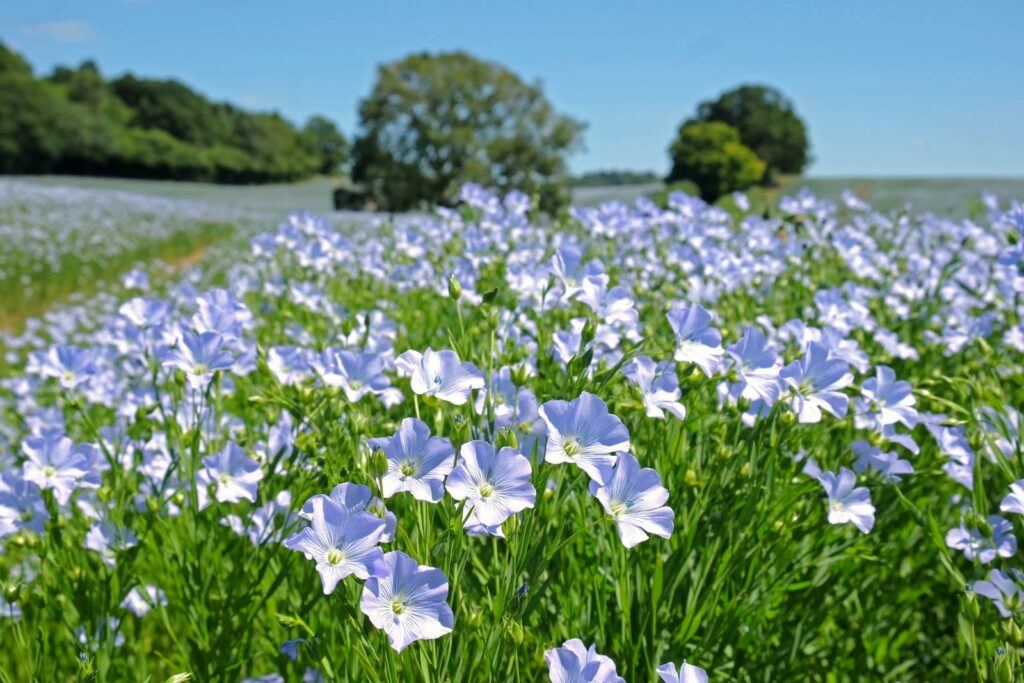Trial to explore the wider benefits of growing flax for regenerative textiles
28th June 2023
A new Innovative Farmers field lab is looking into the commercial viability of growing flax for linen production in Scotland while demonstrating the environmental benefits of growing the crop as part of regenerative rotations.

Stock photo for illustration purposes only.
Flax produces an array of blue flowers loved by pollinators and was grown for textile and linen mills across Scotland for many centuries until cheaper imported textiles became popular in the 1900s.
Scottish varieties of fibre flax were lost, but growers now working with farmer-led research network Innovative Farmers are leading a field lab to find suitable varieties to grow in the UK climate and re-establish a regenerative textile (particularly linen) supply chain.
The trial aims to ascertain how well flax grows and performs in a range of soil types using three trial varieties, as well as explore factors that may influence the retting process and compare the quality of fibre produced. This will be achieved by measuring crop establishment and yield and comparing the results across varieties and sites.
Participants are also hoping to demonstrate the crop as an option for nature-friendly rotations that could meet a growing demand for sustainable textiles.
One of the triallists is Jossie Ellis, who grows vegetables at the 100-acre Lauriston Farm near Edinburgh, which focuses on community engagement and biodiversity alongside food production.
She is providing flax for student research into developing the processing equipment needed to help bring this natural fibre back to the British Isles – as currently there is no commercial processing in Scotland.
She said: “Flax used to be a really important part of the agricultural heritage in Scotland, but it’s been completely lost.
“The field lab is helping us get a sense of how it performs as a crop, which is important because there must have been different varieties that were developed and grown in Scotland because it’s well suited to this region. Finding the seeds that work here will help contribute to that wider work to bring this industry back to the local area. It’s super exciting.”
Other than Lauriston Farm, the field lab trial is being carried out at Inverlonan farm, near Oban, and at the James Hutton Institute’s Balruddery research farm near Dundee.
Field lab design and citizen science
While flax is still grown in the UK for seed, these varieties are shorter-stemmed plants that put their energy into producing seeds rather than tall stems, so don’t provide the long fibres needed to make linen.
The three farmers involved in the trial are utilising knowledge from the Netherlands and France, where 70% of the world’s fibre flax is still grown, to discover which varieties might work best in Scottish growing conditions.
The plant grows well in a range of conditions but is known to thrive and grow tall in temperate climates and damp soil, which makes Scotland an ideal location.
They are testing the performance of three Dutch varieties of flax to assess which are the highest yielding and which produce the best quality fibre, as well as exploring the best time to harvest for textile use.
There is also a parallel citizen science research project with more than 30 growers and groups across 25 community sites across Scotland trialling one variety to complement the growers’ findings by broadening the range of growing conditions being tested.
At Lauriston Farm, they are keen to test the crop’s commercial viability and to engage the local community in home grown fashion.
Ms Ellis added: “We are growing our trial crop with no intervention. If the intention is to grow it at field scale, we want to see what our yields will be in that scenario and see how robust it is.
“It’s also a really interesting crop to engage people on the farm. It’s really pretty with lots of blue flowers, but there’s something about it that people get excited about. It surprises them to realise that’s where linen comes from – people don’t expect their clothes to have come from a plant.
“There’s growing awareness of the significant impact that cotton can have on the environment, and that industry is often very exploitative and highly extractive. It gets people thinking about growing in their everyday lives. It makes people realise that farms are for everyone, and we all have a reliance on the land in ways that we might not have considered.”
Environmental benefits
As well as the potential to provide a UK-grown, biodegradable textile, flax can also be beneficial for nature-friendly farming as it provides food for pollinators and grows well without chemical inputs.
Farming consultant and field lab co-ordinator Colleen McCulloch said: “For farmers interested in diversifying their rotations with crops which are good for biodiversity and suit a regenerative or organic approach, flax fits really well.
“There is a growing interest in regenerative textiles and fashion – people are looking at linen and they can buy it in from Europe, but nobody grows it on a commercial scale here. So, there’s a demand that farmers could meet, as well as flax fitting into low-input and regenerative rotations.
“The field lab is a one-year trial, but the growers are looking to scale up and collaborate with a growing network of other businesses and organisations to establish a commercially viable Scottish linen supply chain in the longer term.”
Innovative Farmers Manager Rebecca Swinn said: “This is an exciting trial that shows the potential of farmer-led research, with real-life trials on farms that are connected to their local communities and ready to collaborate. We are excited to see where these growers can take the regenerative textiles industry in Scotland and the wider UK.”
To find out more and to get involved, visit the field lab portal on the Innovative Farmers website, where any farmer can join the network and find trial information and findings for free.
